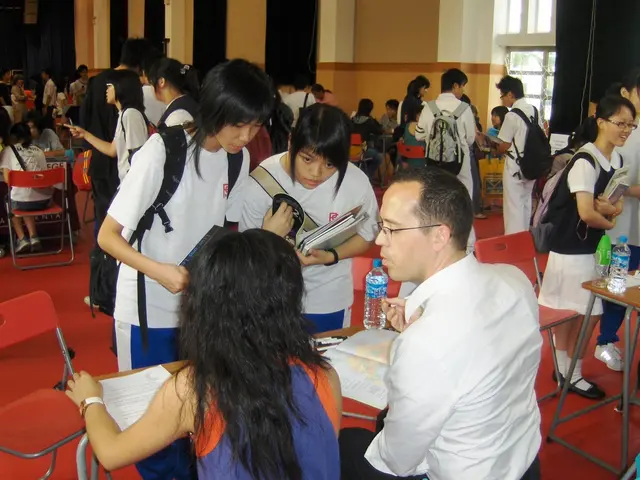Following the declaration of the 2025/2026 academic year kickoff in Saxony, SPD and Die Linke call for substantial, lasting remedies
In an effort to tackle the ongoing teacher shortage, Saxony's Minister of Education, Gerald Eisenblätter, announced the hiring of around 1,100 new teachers for the school year 2025/2026. This move, however, does not necessarily mean an immediate resolution to the issue, as the increase in students continues to strain school education.
Eisenblätter envisions a flexible curriculum and revised lesson plans that foster more self-responsibility, practical orientation, and interdisciplinary learning. He warns against manipulating teacher demand forecast numbers, even with the excuse of decreasing student numbers.
Luise Neuhaus-Wartenberg, the Left party's education spokeswoman, echoes similar concerns, stating that the teaching profession in Saxony is not sufficiently attractive and the local offer is not competitive. She proposes the creation of more comprehensive schools to allow longer joint learning, and families should be given the freedom to choose school types.
The SPD and the Left party in the Saxon state parliament have put forth several solutions and reforms to address the teacher shortage. Their approaches focus primarily on enhancing teacher recruitment and retention, increasing training capacity, utilizing international recruitment, strengthening digital and structural support for teachers, and promoting more flexible career paths and ongoing professional development.
While specific details from SPD and the Left party’s exact proposals in the Saxon parliament are limited, these strategies align with the broader strategies that Saxony and other German states are adopting to counteract the skilled worker and teacher shortages. These strategies include international recruitment efforts and the relaxation of certification requirements, as well as investments in digital teaching tools to ease teaching burdens.
However, consensus-building solutions involving all parties are still lacking. The Left party wants to monitor the implementation of recommendations from the "Bildungsland Sachsen 2030" process. Real reforms are needed, including more multiprofessional teams, school social work at all locations, and consistent digitization.
The teacher training program needs urgent changes to prepare students for the 21st-century school routine. Only 0.006% of public and free schools in Saxony have the capability for longer joint learning. Too many students are failing to complete their education due to the teacher shortage.
Despite these challenges, measures taken in the past to increase the attractiveness of the teaching profession and expand teacher training places are starting to show results in alleviating the teacher shortage. More teaching staff are available for the current school year compared to the last one.
Grammar schools are particularly affected by the teacher shortage. Deployments of teaching staff are expected to continue on a large scale in the future. It is clear that a comprehensive education reform is needed to address the teacher shortage in Saxony.
Saxony's Minister of Education, Gerald Eisenblätter, is aiming to revise education-and-self-development strategies, incorporating a flexible curriculum and revised lesson plans that focus on self-responsibility, practical orientation, and interdisciplinary learning. However, politics enters the conversation as Luise Neuhaus-Wartenberg, the Left party's education spokeswoman, criticizes the teaching profession in Saxony, suggesting the creation of more comprehensive schools and addressing the unattractiveness of the profession. This general-news discussion highlights ongoing efforts to tackle the teacher shortage in Saxony, with both education-and-self-development strategies and politics playing significant roles in proposed solutions.




